Let Ledac lead the way
Almost three months after he laid out his legislative agenda in his inaugural State of the Nation Address, President Marcos Jr. convened on Monday the Legislative-Executive Development Advisory Council (Ledac) to hasten the passage of priority bills.
In what was described as a “productive” first meeting, the 20-member Ledac discussed the executive department’s wish list of laws that promise to put an economy battered by the pandemic, accelerating inflation, and depreciating currency firmly on the path to recovery and fast growth.
Article continues after this advertisementAmong the priority bills tackled by the consultative body are the amendments to the Electric Power Industry Reform Act, the build-operate-transfer law, the budget modernization bill, the national government rightsizing program, and the Government Financial Institutions Unified Initiatives to Distressed Enterprises for Economic Recovery Act.
Aside from 20 priority measures from Malacañang, the Senate and the House of Representatives listed an additional 12 priority bills, including the SIM Registration Act—the first law signed by Mr. Marcos—and the postponement of barangay and Sangguniang Kabataan elections.
“The House and the Senate will give these measures utmost priority. President Marcos clearly spelled out a roadmap of governance in the next six years for economic recovery, with agriculture as the major engine for growth and employment,” House Speaker Martin Romualdez said.
Article continues after this advertisementPassing the entire legislative agenda may be an ambitious target, but there is a glimmer of hope that it can indeed happen with the revival of the Ledac mechanism that worked so well during the Fidel V. Ramos (FVR) administration.
Created through Republic Act No. 7640, the Ledac is a consultative body composed of top leaders from the executive and legislative departments whose primary task is to help the President implement his socioeconomic agenda.
Ledac is chaired by the President, and has as members the Vice President, the Senate President, the Speaker of the House of Representatives, seven members of the Cabinet, three members of the Senate, three members of the House, a representative from the minority, and other government and nongovernment representatives who may come from local government units, the youth, business, cooperatives, agriculture, or labor sectors. Assigned as Ledac principal secretariat is the National Economic and Development Authority.
The goal is that by getting all these government bodies on the same page, it would be easier to pass priority bills through the legislative mill that is notoriously slow and tedious. Unless certified as urgent, it could take years for a bill to become law, especially if the coequal branches of government have different priorities.
Former finance secretary Gary Teves, who had attended a number of Ledac meetings during the Ramos term, recalled how the former President met with the council almost weekly when Congress was in session. Harnessing complete staff work had become one of the Ramos administration’s hallmarks to get key pieces of legislation passed, a total of 239 in all.
These include the landmark build-operate-transfer law of 1994, the Intellectual Property Code of the Philippines, the New Central Bank Act, the Tax Reform Act of 1997, and the “Act Liberalizing the Entry and Scope of Operations of Foreign Banks in the Philippines.”
The closest to FVR’s record is that of former president Gloria Macapagal Arroyo, who convened Ledac 23 times from 2001 to 2009, said Teves, who then advised Mr. Marcos to follow their example and make full use of the council at least once a month, and lead the meetings himself to emphasize the urgency of different priority measures.
While healthy debates are vital so that bills are thoroughly vetted to ensure that they benefit the majority, the lengthy legislative process has often led to aggressive lobbying by vested interests or by officials who have their own political agenda.
It boggles the mind, for example, why Congress is pushing for laws that have little to do with addressing the biggest problems facing the country such as inflation, shrinking income, lack of jobs, and pervasive poverty. An example of these ill-timed bills is the mandatory Reserve Officers’ Training Corps and National Service Training Program, being pushed at a time when the education sector is beset by record-low quality of learning, lack of classrooms and teachers, and problems in implementing full face-to-face classes.
It is thus vital for members of Ledac, particularly those from the legislative and other sectors, to provide enlightened voices to push for measures that are more urgent and most needed to support economic recovery and help more Filipinos get out of poverty.
By harnessing Ledac to push its top priorities, the Marcos Jr. administration is starting on the right foot. But Ledac must be strong and wise enough to shepherd only the most urgent and most beneficial laws Filipinos need at this time.

















